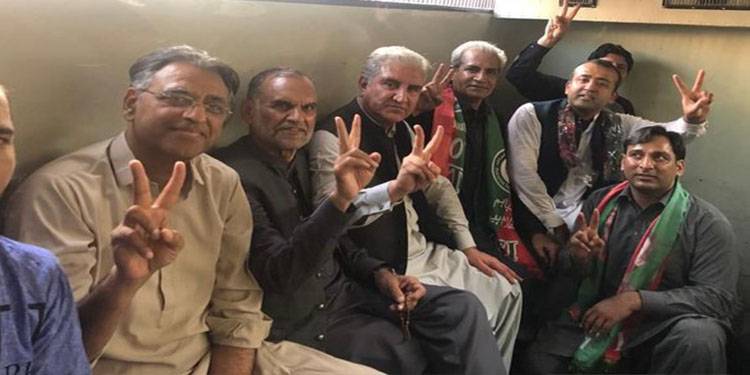
A lawyer for the Pakistan Tehreek-e-Insaf (PTI) gave a statement in the Lahore High Court (LHC) that the party's leaders actually surrendered to police for a 'symbolic arrest' but they ended up actually getting arrested. The lawyer beseeched the LHC to release the PTI leaders who had volunteered themselves to 'fill the jails' in line with PTI chairman Imran Khan's 'Jail Bharo Tehreek'.
Justice Shahram Sarwar of the LHC heard the petitions for the recovery of Shah Mehmood Qureshi, Asad Umar, Azam Khan Swati and Waleed Iqbal, all of whom presented themselves for arrest in the 'Jail Bharo' movement. The learned judge ordered the public prosecutor to submit a report on the incident by 27 February.
The PTI lawyer said that the leaders of his party were being kept in "illegal detention" by the police. The honourable judge said that the police were not arresting them, but they themselves sat in the police cars and prison vans. At this remark from the judge — exposing the hypocrisy in the PTI's stance — there was a short outburst of laughter in the court.
Justice Shahram remarked that the PTI should have asked the home secretary to put their lesders under house arrest, where all facilities they require would be available to them. The PTI lawyer requested the court to ask for an answer from the authorities on the same day. The court, however, rejected the request.
Shah Mehmood Qureshi's son Zain Qureshi, himself a former legislator who resigned from the National Assembly in April 2022 and then secured a seat in the Punjab assembly by-election till the legislature was dissolved, said that he went to Charing Cross but was not arrested. Justice Shahram remarked to Zain that he went himself to present his arrest, and asked him to tell the court if he was not sitting in the police car himself. "You are sad that the arrested leaders were taken out of Lahore," the judge further remarked.
The petitioner's lawyer said that the arrests of PTI leaders were symbolic. But the police actually arrrsted them. The justices said, "First you volunteered for getting arrested yourself, now you have come to burden the courts," the court remarked, asking "where is it written in the law, that please arrest me?"
Justice Shahram Sarwar of the LHC heard the petitions for the recovery of Shah Mehmood Qureshi, Asad Umar, Azam Khan Swati and Waleed Iqbal, all of whom presented themselves for arrest in the 'Jail Bharo' movement. The learned judge ordered the public prosecutor to submit a report on the incident by 27 February.
The PTI lawyer said that the leaders of his party were being kept in "illegal detention" by the police. The honourable judge said that the police were not arresting them, but they themselves sat in the police cars and prison vans. At this remark from the judge — exposing the hypocrisy in the PTI's stance — there was a short outburst of laughter in the court.
Justice Shahram remarked that the PTI should have asked the home secretary to put their lesders under house arrest, where all facilities they require would be available to them. The PTI lawyer requested the court to ask for an answer from the authorities on the same day. The court, however, rejected the request.
Shah Mehmood Qureshi's son Zain Qureshi, himself a former legislator who resigned from the National Assembly in April 2022 and then secured a seat in the Punjab assembly by-election till the legislature was dissolved, said that he went to Charing Cross but was not arrested. Justice Shahram remarked to Zain that he went himself to present his arrest, and asked him to tell the court if he was not sitting in the police car himself. "You are sad that the arrested leaders were taken out of Lahore," the judge further remarked.
The petitioner's lawyer said that the arrests of PTI leaders were symbolic. But the police actually arrrsted them. The justices said, "First you volunteered for getting arrested yourself, now you have come to burden the courts," the court remarked, asking "where is it written in the law, that please arrest me?"

